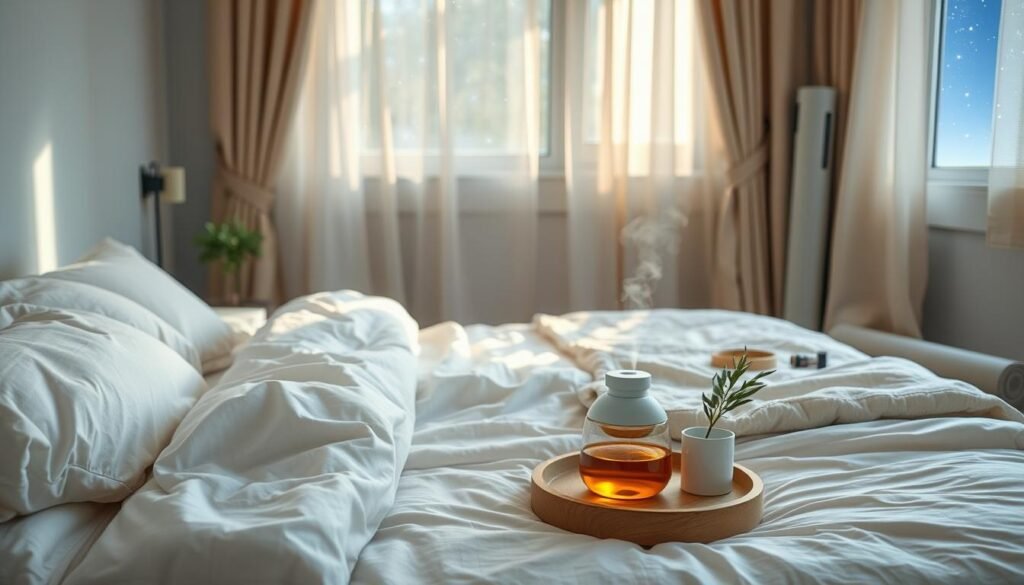Surprisingly, about one-third of U.S. adults don’t get enough sleep. They often blame their lack of rest on poor digestion and restless nights. The connection between sleep and digestion is complex. Disrupted sleep can make digestive problems worse, leading to a cycle of discomfort and tiredness. On the other hand, poor digestion can make it hard to sleep well. This causes ongoing fatigue. This guide will look into the link between sleep issues and digestion. We will see how lifestyle choices, including what we eat, are key to sleeping better and staying healthy.
Key Takeaways
- Disrupted sleep affects nearly one-third of U.S. adults, often linked to poor digestion.
- Dietary choices can significantly impact both sleep quality and digestive health.
- Consuming sleep-promoting foods like tart cherries and oily fish can enhance rest.
- Avoiding caffeine, alcohol, and heavy meals close to bedtime is crucial for better sleep.
- Maintaining a balanced diet with adequate nutrients is essential for optimal sleep quality.
- Understanding the interplay between digestion and sleep can help improve daily energy levels.
Understanding the Connection Between Sleep and Digestion
The link between sleep and digestion is both important and complicated. Studies show, when one suffers, the other might too. For example, not getting enough sleep can make stress go up. This can lead to gut issues like bloating and inflammation. Problems with sleep and digestion often feed into each other, making matters worse.
Moreover, not sleeping enough can cause poor eating habits. This can hurt gut health. Lack of sleep messes with melatonin, the sleep hormone. This can slow down the gut and make acid reflux worse. Both issues can harm sleep quality even further.
Eating late at night can also stress the digestive system. It forces the body to work on digestion when it should be resting. People who already have health issues may find their problems get worse with sleep loss. It’s key to understand how sleep and eating times affect each other.
Many Americans have sleep problems. Up to 70 million people in the US are struggling. Poor sleep can lead to bad gut health. So, it’s important to take care of both to stay healthy.
If you want to understand more about why food makes you tired, check this detailed guide.
Why Disrupted Sleep, Poor Digestion, and Discomfort Leading to Tiredness Matter
Sleep and digestive health are closely linked, affecting our overall well-being. Addressing sleep disruption and digestive issues is key to avoid feeling tired every day. By understanding this connection, we can find ways to improve our lives.
The Impact of Disrupted Sleep on Daily Life
Not getting enough sleep can make daily life hard. It can leave us feeling tired, unable to focus, or work well. People might also feel moody and find it hard to get along with others.
Experts say getting 7 to 9 hours of sleep each night is best for our health. Sleeping less can increase the risk of heart disease, obesity, and mental health problems.
How Digestion Affects Sleep Quality
Good digestive health is important for sleeping well. Issues like heartburn can make it hard to fall asleep and stay asleep. Eating big meals close to bedtime can also cause sleep problems.
Poor sleep can affect hormones that control hunger, leading to bad food choices. This can make digestive issues worse and harm our overall health.
| Issue | Effects |
|---|---|
| Disrupted Sleep | Daily fatigue, reduced productivity, mood swings |
| Poor Digestion | Sleep disturbances, discomfort, increased appetite |
| Overall Wellness | Higher risk for diseases, impaired mental health |
To live a better life, it’s important to understand the link between sleep and digestion. Taking steps like managing stress and eating mindfully can help us stay healthy.
Common Sleep Disorders Related to Digestion
Sleep disorders can make daily life hard, especially with stomach issues. Insomnia, for example, may come from digestion problems. People often can’t sleep well because of stomach pain or feeling bloated. This lack of sleep can make stomach issues worse, creating a harmful cycle.
Sleep apnea is another common sleep issue. It’s seen more in those who are overweight or have chronic pain. This condition stops you from breathing right at night. It leads to bad sleep and feeling tired and moody during the day. This can make digestion problems more complicated. Studies show not treating sleep disorders could increase the risk of heart disease and diabetes. It’s vital to look at sleep and stomach problems together.
GERD is where sleep and digestion problems meet. People with GERD often have trouble sleeping at night. The discomfort at night increases. Insomnia and GERD are common in those with chronic pain or anxiety. Getting help for both sleep and stomach issues can bring back balance to your health.
To know more about how digestion affects appetite and energy, check out this comprehensive resource. Understanding sleep and digestive problems can help improve life quality.
Signs and Symptoms of Poor Digestion Affecting Sleep
Knowing the signs of poor digestion helps those with sleep issues. Symptoms like bloating, gas, and stomach pain disturb sleep by causing discomfort. This often makes it hard to get good sleep during the night.
Recognizing Discomfort and Digestive Issues
It is important to notice poor digestion signs for better sleep. Symptoms include:
- Bloating and gas
- Stomach pain or cramping
- Acid reflux or heartburn
- Nausea or changes in appetite
Digestive problems can ruin a good night’s sleep. Sadly, about 70 million Americans deal with these issues every year. Many don’t realize how much it affects their sleep.
Identifying Restlessness and Fatigue
There’s a clear link between digestive problems and tiredness. About half of the people with long-term fatigue have IBS. This shows how gut health affects energy levels.
Understanding how sleep and gut health are connected is key. For example, 40% of IBS patients struggle with sleep. Most of our serotonin, important for mood and sleep, is made in the gut.

The Role of Diet in Sleep Quality
Diet greatly affects how well you sleep. It determines if you can fall asleep and stay asleep. Certain foods for better sleep help your body rest well. But, some foods may interrupt sleep. Knowing which foods impact sleep can lead to more peaceful nights.
Foods That Promote Better Sleep
Eating the right foods can improve your sleep. Studies show foods high in melatonin, magnesium, and amino acids help. Here are foods that are good for sleep:
- Melatonin-rich foods: Cherries, bananas, and grapes boost melatonin levels.
- Complex carbohydrates: Snacks like oatmeal and whole-wheat toast are good before bed.
- Lean proteins: Eating fish, poultry, and legumes supplies B vitamins for sleep regulation.
- Hydrating fruits: Kiwifruit and tart cherry juice have antioxidants for better sleep.
These foods enhance both diet and sleep quality. They help you sleep better at night. For more on diet and sleep, read this study.
Foods to Avoid for a Restful Night
Some foods can make it hard to sleep, especially before bed. They include:
- Caffeine: It’s in coffee, tea, and chocolate and can keep you awake.
- Heavy, spicy meals: They may cause discomfort and heartburn.
- Alcohol: It might make you drowsy at first, but then disrupt your sleep.
- Sugary snacks: Too much sugar can wake you up at night.
Being mindful about what you eat shows the link between diet and sleep quality. Making healthy food choices helps with sleep and digestion.
| Foods Promoting Sleep | Foods to Avoid |
|---|---|
| Cherries | Caffeine |
| Oatmeal | Spicy meals |
| Fish | Alcohol |
| Kiwifruit | Sugary snacks |
Improving Sleep Hygiene for Enhanced Digestion
Better sleep starts with good sleep hygiene. It deeply affects our digestion. A peaceful sleep environment and a consistent sleep schedule can make you feel and digest better.
Creating a Peaceful Sleep Environment
To sleep and digest well, you need a calm bedroom. Here’s how to make your bedroom peaceful:
- Lower noise with soundproofing or use white noise machines.
- Keep out light, especially from screens, to not disrupt melatonin.
- Keep your bedroom cool, around 60 to 67 degrees, for comfort.
- Choose comfy bedding and pillows for better sleep.
These steps help you sleep deeply and digest better. For tips on good sleep hygiene, check out this resource.
Establishing a Consistent Sleep Schedule
A regular sleep schedule helps your circadian rhythm. It makes sleeping and waking up easier. Try these strategies:
- Sleep and wake up at the same times every day, even weekends.
- Avoid heavy or stimulating meals before bed.
- Cut back on caffeine and nicotine before sleeping.
- Have a relaxing routine before bed to get ready for sleep.
Keeping a regular sleep pattern improves your digestion. It shows how important sleep is for digestive health.

Natural Remedies for Better Sleep and Digestion
Exploring natural remedies can improve sleep and digestion. This boosts overall health and wellness. There are many herbal supplements and lifestyle changes that can help.
Herbal Supplements and Sleep Aids
Herbal supplements are a soft way to get better sleep. Valerian root helps when taken before bed, in doses of 300–600 mg. Chamomile tea is great for relaxing and sleeping better. Passionflower, in tea or extract, can slightly better sleep for some.
Melatonin, in 3–10 mg, helps against jet lag or shift work sleep issues. Lavender aromatherapy is known for its calm scent, aiding in better sleep for everyone. It’s important to watch for side effects like feeling sleepy during the day or stomach issues.
Lifestyle Changes for Digestive Health
Changes in lifestyle can also improve your digestion and sleep. Exercising helps with digestion and sleeping longer. Stress-reducing activities like yoga or meditation benefit both sleep and digestion.
Eating the right foods matters too. Foods high in complex carbs, like oatmeal and whole-wheat toast, support digestion. They also help release serotonin, which is good for sleep. Avoiding spicy and high-fat foods keeps your body temperature stable, helping you sleep better.
| Herbal Supplement | Dosage | Potential Benefits | Side Effects |
|---|---|---|---|
| Valerian Root | 300–600 mg | Improves sleep quality | Headache, dizziness |
| Chamomile | Tea or extract | Promotes relaxation | Nausea, dizziness |
| Melatonin | 3–10 mg | Enhances sleep quality | Daytime drowsiness |
| Passionflower | Tea or extract | Helps improve sleep | Drowsiness, confusion |
| Lavender | Aromatherapy | Soothes and improves sleep | Generally safe |
When to Seek Medical Advice for Sleep Issues
Understanding when to get help is key for your health. This is true for sleep issues related to digestion. Chronic or severe symptoms in sleep and digestion should be checked by doctors to find out the cause.
Recognizing Serious Sleep Disorders
Serious sleep disorders can make you very tired and hurt your digestion. If you have these symptoms, it might be something serious:
- Persistent insomnia affecting daily activities.
- Unusual breathing patterns during sleep, such as sleep apnea.
- Excessive daytime sleepiness or fatigue beyond regular tiredness.
- Severe anxiety or depression contributing to sleep disturbances.
- Chronic pain or discomfort making it difficult to achieve restful sleep.
If you regularly have these symptoms, seeing a doctor is important. Not doing so could make things worse. This affects both sleep patterns and digestion.
Consultation with Healthcare Professionals
Getting help early often leads to better health later on. Doctors can spot serious sleep issues with tests, like:
| Assessment Type | Purpose |
|---|---|
| Sleep Studies | Monitor sleep patterns to diagnose disorders like sleep apnea. |
| Physical Exams | Identify underlying health issues contributing to fatigue. |
| Psychological Evaluations | Assess for anxiety or depression that may impact sleep. |
Knowing when to seek help involves tracking your sleep and emotional and physical health. This makes talking to doctors easier. Dealing with sleep issues fast can improve your life and digestion health a lot.

Practical Tips for Combining Sleep Improvement and Digestive Wellness
To improve sleep and digestive health, it’s wise to use a holistic approach. Various relaxation techniques and a healthy gut are key. They help create a peaceful setting for good sleep and digestive health.
Relaxation Techniques Before Bed
Adding relaxation methods to your nighttime routine can make a big difference in sleep quality. Here are some suggestions:
- Mindfulness meditation: Mindfulness makes it easier to relax by clearing your thoughts.
- Gentle yoga: Gentle stretches help relax the body and calm the mind.
- Deep breathing exercises: Taking slow, deep breaths helps lower heart rate and ease anxiety.
Maintaining a Healthy Gut for Better Sleep
A healthy gut is crucial for good sleep. Here are some tips:
- Consuming probiotics: Yogurt, kefir, and fermented veggies are good for gut health.
- Incorporating fiber-rich foods: Eating whole grains, fruits, and veggies aids digestion. This helps avoid discomfort at night.
- Avoiding heavy meals before bedtime: It’s better to eat light dinners so digestion doesn’t disrupt sleep.
| Relaxation Technique | Benefits |
|---|---|
| Mindfulness Meditation | Reduces stress and improves mental clarity |
| Gentle Yoga | Promotes physical relaxation and aids digestion |
| Deep Breathing | Calms the nervous system, making it easier to sleep |
| Probiotics | Supports gut health, aiding digestion and sleep |
| Fiber-Rich Foods | Regulates digestion, preventing discomfort |
By focusing on these practical tips, you can balance sleep improvement and digestive wellness. This leads to restful nights and better health overall.
Conclusion
Sleep and digestion play a key role in our overall health. When we improve these areas together, we can feel much better. Making these changes can boost our energy and make our minds clearer. This makes our daily activities more enjoyable.
Recent research shows how sleep, pain, and digestive problems are linked. People in these studies felt their life quality got better when they tackled these issues. Anyone looking to understand the impact of not sleeping enough should check out this detailed look at sleep issues.
We can improve our sleep and digestion with some simple steps. Choosing better foods and sticking to a sleep schedule can make a big difference. This approach boosts our health and helps us handle stress better. It’s all about seeing sleep and digestion as parts of one big health puzzle for a better life.